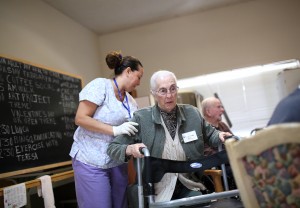By Kamal Menghrajani

Some people who care for vulnerable older adults are in dire economic straits, according to a new study [PDF] from the UCLA Center for Health Policy Research.
Hundreds of thousands of people provide care – from cooking and cleaning to bathing and dressing – for adults with disabilities or long-term illnesses who receive benefits from Medi-Cal. As it turns out, those who get paid for this work may not be pulling in enough money to make ends meet.
Geoffrey Hoffman, a researcher at the Center and lead author of the report said, “These paid Medi-Cal caregivers have incomes that are quite low compared to other Californians, about half as much monthly household income.”
He continued, “A third of them do not have health insurance. A number of them live in poverty or near-poverty, and, among those, a third of them have what is called ‘food insecurity’ – not enough food to put on the table every month.”